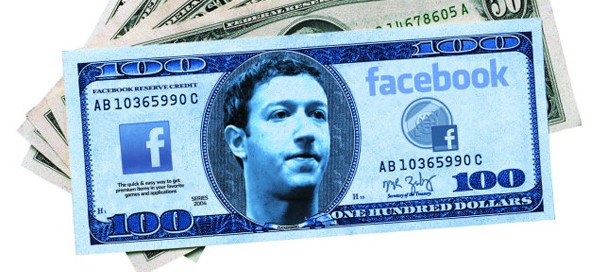On the first of the month, Facebook filed to become a publicly traded company and announced that it hoped to raise a quick $5 billion dollars in its initial public offering, the largest IPO in history. After turning a $1 billion dollar profit in 2011, Zuckerberg, the company’s newly-minted chairman and CEO, will become the largest and most controlling stockholder. Those of us on the other end of the server, the users, frienders, likers, and content-creators, will continue to be paid in zombie invitations, pokes and almost-monthly UI changes.
And why shouldn’t we? Asking users to get paid is like saying that Verizon should pay their customers for calling their friends, argues Sandeep Dahiya, a finance professor at Georgetown University. Others liken it to a café paying patrons for hanging out. No one argues that having people at a bar or restaurant helps create the atmosphere, but you’d be hard-pressed to find someone who thinks it makes sense to pay them for doing so.
The problem is that these metaphors don’t reflect the world of social media. Facebook and its ilk are unlike anything we’ve ever had to deal with before, economically or socially. So far, most new media sites have relied on an advertisement-based business model. They offer a free service in exchange for the opportunity to mine users’ profiles for information which is then sold to advertisers. So far, it’s been working. Along with multi-billion dollar revenues, Facebook has seduced 845 million users, 80% of whom live somewhere other than the U.S. or Canada. From Hollywood to Bollywood, Facebook has become a permanent facet of the cultural landscape and its influence just keeps growing.
But not everyone is singing Facebook’s praises. Jaron Lanier, author of You Are Not a Gadget and coiner of the term “virtual reality,” thinks the company needs a serious overhaul. “I’m not in any sense anti-Facebook. In fact, I believe that wealthier users in the long term will make for a wealthier Facebook, which I would view as a good thing.” What he’s talking about is the possibility of Facebook paying users for generating content.
Lanier wants Facebook to consider a model that allows for more reciprocal payment between the company and its users. If Facebook charged users a small amount to use the website and paid them for creating content that appeals to other users and third parties, the company could continues to make (gobs of) money while sharing that wealth with the people that take their software from machine to meaningful.
If it sounds implausible, take a second to think about everything that our technology can do. There’s already an abundance of data-mining software that generates information to be sent out to advertisers; Lanier is suggesting that they redirect that information so that they can pay the deserving parties. And for good reason; the alternative is an ugly future dominated by commercialism and concentrated wealth.
“That’s a dead end in the long term for civilization. I mean, you can’t have advertising be the only official business of the information economy if the information economy is going to take over.”
If advertising becomes the only way to make money, we’ve got bigger problems on our hands than whether or not I get $3 every year for participating in Facebook. More often than not, advertisements are made to appeal to the lowest common denominator. Which isn’t exactly great news for innovation.
Lanier has some thoughts about how we can move away from advertising-centric online business models and advocate for progress on the Internet and in real life. He thinks we should pay each other for things we like. By using our money to show interest in things, we’re fighting oppressive capitalism with more capitalism, and helping create a mobile middle class. With our society becoming increasingly mechanized, it’s easy to forget that the things we really enjoy don’t come from computers, they come from other people. Most of us don’t love Facebook for its flawlessly engineered software, we love it because it lets us keep up with our family who lives far away and our friends who we haven’t seen in ages. By paying for what we like, we’re creating a sustainable model that encourages creativity, appreciates differences and, according to Lanier, supports democracy.









Comments
this totally just changed the game!
The Zuckerberg smeyes is so unsettling. You just know he’d sell ad space in your brain if he could.
There’s a saying that if you can’t see what they’re selling, they’re selling you (you’re data).
Facebook is very different than the Verizon example – Verizon isn’t recording all your calls, parsing them to then sell hyper-targeted ads at you and then delivering those ads directly into your ear.
Yes, Facebook has an infrastructure requirement (all the servers, etc.) that make it possible for people to connect. But they’re not selling us access to their hardware; they’re selling advertisers nearly unfettered access to the info we share with our friends (our lives). Clearly, advertisers are willing to pay billions of dollars for that info. Yet who’s benefitting?
One of the things that disappoints me the most about all the social media is that the participation (content) is primarily driven by women – Pew has a bunch of research on this – yet any/all the wealth is being consolidated into the hands of the same, increasingly small band of people. I just finished the Hunger Games and I can’t help but draw a parallel between those of us in District Social vs. the investment titans in the Capitol. (I mean this only financially; obviously there’s no parallel between starvation and chatting with friends on fb.)
Here’s a link from Pew Internet Aug-2011:
“Looking more closely at gender differences, women have been significantly more likely to use social networking sites than men since 2009. As of May 2011, nearly seven in ten online women are users of social networking sites (69%), compared with six in ten online men (60%). Women are also more active in their use of these sites, with almost half of female internet users using social networking sites on a typical day (48%), compared with 38% of male internet users.”
Does that make those of us who refuse to take part of District Social inhabitants of District 13? The ones District Social members retreat to once their homes get bombed out (ie: not cool anymore)?
The non-fb users aren’t in the Districts, they’re hiding out in the wilderness off the grid
Honestly, I put way too much thought into Hunger Games parallels (I literally just finished the books). Right now, I think District 13 is Pinterest. Check out this Tech Crunch article.
“In fact, users are spending so much time sharing their favorite images that now only Facebook and Tumblr have more social media time on site than Pinterest. Who’s propelling its rise? 18-34 year old upper income women from the American heartland.”
“If you don’t count sites like Google+ or new Yahoo channels that have built in user bases, comScore’s data shows Pinterest would be the fastest site of any kind to hit 10 million monthly uniques in the U.S.”
Some retailers are seeing comparable traffic driven from Pinterest as from Facebook (which is infinitely larger). But we can’t forget the Capitol:
“Suddenly, it seems the investors that got in at that rumored $200 million valuation, and especially that $40 million valuation from September pinned a real winner.”
I haven’t seen any data, but I’m guessing there are few women in those early VC rounds. And however well-intentioned, it seems like most company CEOs in this domain end up tending toward a President Coin approach at best, so there’s that.
As the venture capitalists are pouring millions of dollars into Big Data projects (here’s a chirpy NYT article about Big Data’s ascension, the Obama administration has issued a challenge to app developers to harness basic app technology so women can have the salary data they need to start getting paid more comparably to men:
“Right now, if you’re a woman in the workforce, it can be surprisingly difficult to answer basic questions about equal pay: what’s the typical salary for someone in your position? Should you be asking for more at the negotiating table? What are your fundamental legal rights?”
“When the Equal Pay App Challenge is over, you’ll have information that helps you answer these questions, available right on your smartphone or computer. We believe that the same types of innovations that help you find movie times or get a great deal at a restaurant can help you protect your rights in the workforce.”
To me, these kinds of initiatives have mockingjay potential.
i just finished it and it was so hard for me to not make a “hunger games” reference. especially because in one of the videos, lanier was talking about how those closest to the center are making all the money while those on the edges get nothing. i just kept thinking “the capital!”
Sometimes I long for the days of pre-Facebook. It’s insane thinking about how involved Facebook is in people’s lives.
+1
mark zuckerberg looks like an awkwardly formed kangaroo
emphasis on the awkward part